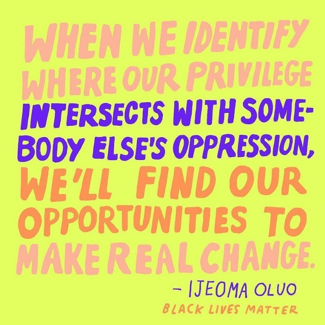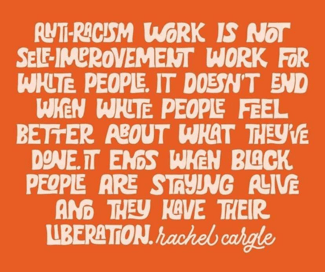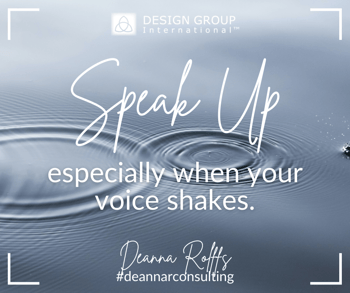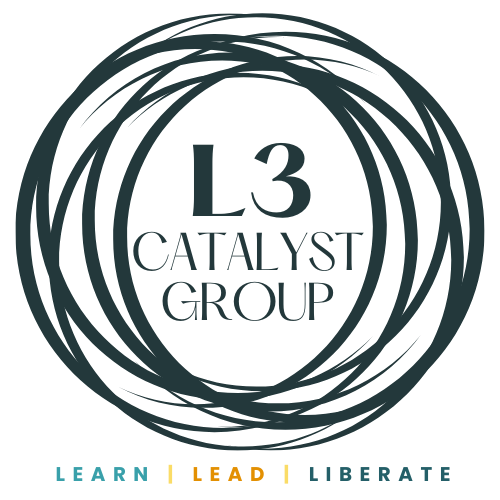Recently a white woman asked me: "Who are you to do anti-racism work? You are white."
Good Question.
Just as my husband is a feminist but isn’t a woman, I'm a white person committed to racial equity. I’m glad my husband speaks up, demonstrates that he doesn't know all of the things about gender oppression, and is willing to take risks. He knows that women are experts in their own lives. He's willing to disrupt misogyny with other men, and believes we are all free when women are liberated.
 Are you a white person that wants to work for anti-racism?
Are you a white person that wants to work for anti-racism?
Consciousness about whiteness is critical in life and leadership. It is imperative to see it play out every day in ourselves, our relationships, our organizations, and our systems. Key moves include: embracing discomfort, using our voices, understanding and spending our power to speak up, sharing why we want to disrupt inequity, speaking from the heart, acting without expecting a badge or kudos, and not centering ourselves.
White consciousness is:
“One’s own awareness of being white and what that implies in relation to those who do not share white group membership.”
(Rowe, 1994)
“The idea that consciousness, the cognitive and sensory experience of one’s relationship with the world, is shaped by one’s white racial identity.”
(Perhamus, 2018)

If we white folks don't do this by following and working in close relationship with BIPOC, we can so quickly center ourselves, and make anti-racism personal improvement for white people. Liberation is the goal.
This wisdom has been shared with me by friends and colleagues of color:
- Speak up, especially when your voice shakes.
- Don't be afraid to be wrong; learn from it, buck up, and keep working for justice.
- Don't get swayed by the haters.
- Never presume that we white people "get" oppression that we benefit from, but keep trying.
- Always stay open, curious, and committed.
- Ground the work in relationship, application, love, and liberation.
Fighting racism, as a person with race privilege, isn't a fight I get to say I'm good at. It isn’t personal development or accolades; it’s the price I pay for walking this earth. It’s something that I can’t turn away from or unsee once I’ve seen it. It's what love looks like in public. (credit of this paraphrased idea goes to Dr. Cornel West)
 Leadership development, strategic commitments, and organizational change [or insert today’s most popular leadership concept] will only be effective when rooted in anti-oppression commitments. Let's be active in disrupting inequity. Deeply understanding whiteness as a social construct is critical.
Leadership development, strategic commitments, and organizational change [or insert today’s most popular leadership concept] will only be effective when rooted in anti-oppression commitments. Let's be active in disrupting inequity. Deeply understanding whiteness as a social construct is critical.
“It doesn’t matter how strong your opinions are. If you don’t use your power for positive change, you are, indeed part of the problem.” Coretta Scott King
In closing, this piece is Part 1 to a series about whiteness and white consciousness, unpacking topics such as these:
- Why is consciousness about my whiteness integral to...everything?
- White fragility, it's actually violent
- White privilege, are we still debating this?
- Whiteness application to gender and misogyny
- Intersectionality isn't just the presence of difference
- Why reverse racism isn't a thing
What topics do you wish I'd unpack regarding whiteness? I'd love to hear your ideas.
Fellow leaders and learners, I wish you courage and resilience for the journey.
Peace to you,


What I’m Reading & Watching
Regarding This Topic:
- What is Privilege?
- Black and Brown People Have Been Protesting for Centuries. It's White People Who Are Responsible for What Happens Next by Savala Nolan via time.com
Questions for Consideration
Regarding This Topic:
- What is your calling on this earth, at this time? How are you living that out today?
- How do you describe your anti-racist commitments? How do you interact with those for whom anti-racism isn’t on their radar?

Catch-up on Previous
Leadership & Learning Letter Topics:
Tags:
Miseducation, diversity, anti-white supremacy, anti-racism, leadership development, equity, inclusion, anti-oppression, definitions
July 28, 2021





Comments